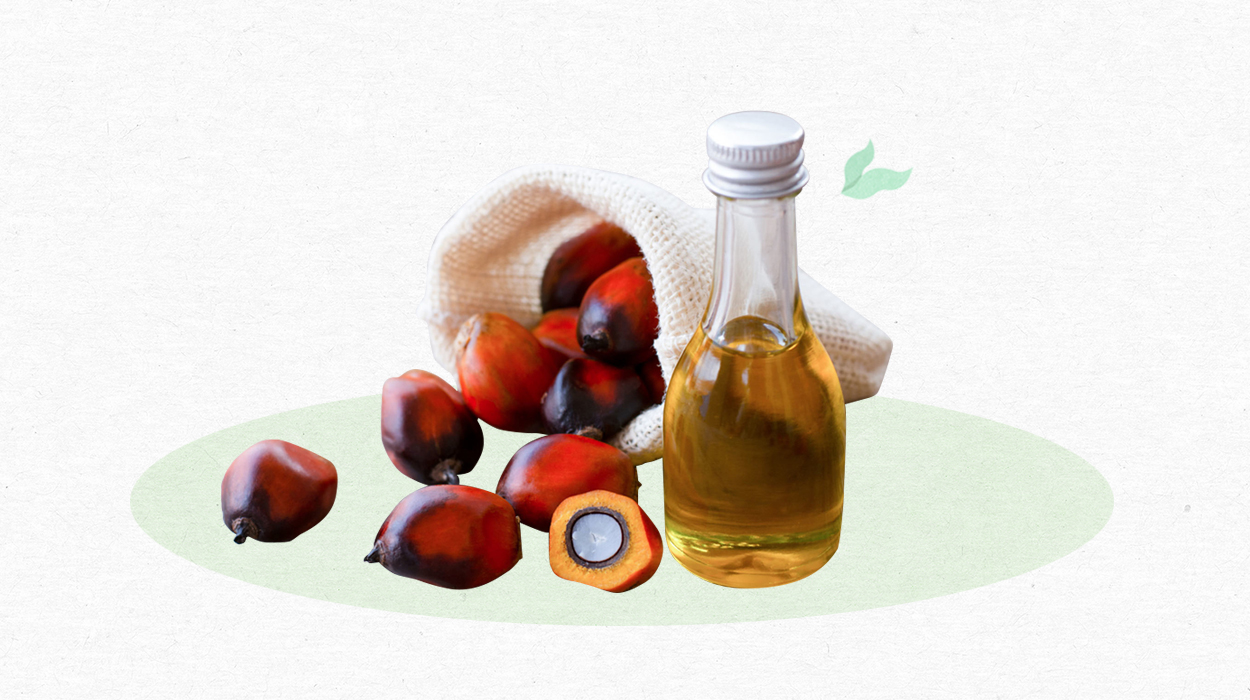 Evidence Based
Evidence Based
Evidence Based
This article is objectively based on relevant scientific literature, written by experienced medical writers, and fact-checked by a team of degreed medical experts.
Our team of registered dietitian nutritionists and licensed medical professionals seek to remain objective and unbiased while preserving the integrity of any scientific debate.
The articles contain evidence-based references from approved scientific sites. The numbers* in parentheses (*1,2,3) will take you to clickable links to our reputable sources.
Is Palm Oil Vegan? Learn The Surprising Truth Behind This Product In 2024

Most oils are vegan, depending on your specific definition of vegan. But with so many oil products on the market, it’s crucial to look at each oil specifically to determine its vegan status.
Is palm oil vegan? This popular cooking oil is among those highly debated in the vegan world. While it is a vegetable-derived product and technically safe for a vegan diet, production methods have raised significant ethical concerns.
Let’s further explore the complicated question of palm oil’s vegan status.
Is Palm Oil Vegan-Friendly?
Yes, palm oil is vegan-friendly. Palm oil comes from the fruits of palm oil trees, making it a plant-based product. However, many question its vegan-friendliness due to poor environmental practices linked to production.
While it doesn’t originate from animals, the ethical and environmental repercussions prompt some vegans to avoid palm oil and seek more sustainable sources.
Is Palm Oil Allowed On A Vegan Diet?
Palm oil is considered a vegan food because it is derived from vegetables. From a strict ingredient standpoint, it does not contain animal products. However, ethical considerations surrounding its production raise concerns for many vegans.
Environmental repercussions of palm oil cultivation, including vast deforestation and loss of animal habitat, lead some to question its place in a conscientious vegan lifestyle. Therefore, whether or not palm oil is vegan-friendly should be addressed individually based on ethical considerations.
What Is Palm Oil?
Palm oil is the most commonly used[1] vegetable oil in the world today. Palm fruit oil has been cultivated for more than 5,000 years from the African oil palm. It’s an edible vegetable oil derived from the pulp of the fruit of the oil palms.
Palm oil is derived from the fruit, and palm kernel oil is derived from the seed. The seed or walnut contains about 30%-35% oil and is used to produce palm nut oil.
Palm oil is noteworthy from a nutritional perspective, containing a unique composition of fatty acids. It provides a healthy alternative[2] to trans-fatty acid-containing hydrogenated fats.
In terms of vitamins and minerals, palm oil also offers an array of phytonutrient health benefits. It is exceptionally high in beta-carotene, which is a precursor to vitamin A.[3] It also contains tocotrienols,[2] a form of vitamin E known for its potential antioxidant properties. Therefore, it can be included in moderation as part of a healthy diet with a good balance of protein, carbohydrates, and fruits and veggies.
What Is Palm Oil Used For?
Palm oil is primarily used in the food industry to replace animal fats[1] and hydrogenated fats. As one of the most stable oils, it prolongs food storability. It’s semi-solid at room temperature and resistant to oxidation.
Food Preservation And Cooking
As a cooking oil, palm oil is used in various food applications. Frying, margarine, shortenings, and vegetable ghee are a few examples. Palm oil acts as a preservative, so you may find it in shelf-stable products like instant noodles, crackers, and cookies.
Its questionable vegan status may prevent its use in vegan meal delivery and vegan meal replacement products, but it’s typically used to help keep products fresher and longer. Fortunately, many vegan products, like green powders, don’t typically add palm oil — just be sure to check the ingredients.
Industrial And Personal Care Products
Palm oil is also excellent raw material[4] for industrial uses that are similar to petro-diesel. It’s used in industrial applications such as biofuels, lubricants, inks, waxes, and pesticides. It’s also used in personal care and cosmetics, including shampoos, conditioners, sunscreens, and lipsticks.
Pharmaceuticals
Palm kernel oil and palm oil are also ingredients found in the pharmaceutical industry. Palm oil can be part of lipid-based formulations for certain drugs and exhibits high drug-loading capacity[5] to provide more efficient drug absorption. It’s also used as a tablet-coating agent to extend the shelf life of certain medications.
Why Is Palm Oil Not Vegan Sometimes?
Palm oil continues to be a significantly controversial topic in veganism for many reasons. While palm oil is plant-based and does not contain animal products, its vegan designation is debated for ethical and environmental concerns.
For many vegans, the diet is not just about avoiding animal products but also minimizing harm. Balancing the economic benefits of palm oil with its environmental and social impacts is a challenge for many. As consumers, informed choices and supporting certified sustainable palm oil can drive positive change within the industry.
Impact Of Palm Oil
Here are some reasons[6] why many vegans object to palm oil use and consumption:
Deforestation And Habitat Loss
One of the most pressing concerns is the conversion of tropical forests and peatlands into palm oil plantations. This leads to deforestation and habitat destruction for various species. Endangered animals like orangutans, rhinos, elephants, and tigers are often impacted by the mass cultivation of palm oil in countries like Africa, Indonesia, and Malaysia.
Biodiversity Loss
As tropical rainforests are cleared for oil palm plantations, the ecosystem loss is substantial. Palm oil production disrupts entire ecosystems, causing irreversible damage to plants, vegetation, and wildlife.
Greenhouse Gas Emissions
Land conversion and deforestation also increase global carbon emissions. Since the draining of peatlands releases stored carbon, this can add to climate change.[7]
Social Impact
The expansion of palm oil plantations has led to social conflicts, land grabbing, and violations of indigenous rights in some regions. Industry labor practices[8] have also been scrutinized, with poor working conditions and low wages reported.
Are There Any Chances Palm Oil Production Be Sustainable?
Since palm oil is a very productive crop, it’s not possible to avoid palm oil products altogether. It also positively contributes[9] to the livelihood of local communities, improving incomes. Still, palm oil companies need to urgently address the social and economic impact going forward.
Sustainable palm oil production practices require having a global supply chain using environmentally friendly and socially acceptable sourcing. While significant research has been done to understand and respond to environmental impacts, social impacts lack information.
Ongoing initiatives already exist to attempt to make the palm oil sector more sustainable. These include promoting responsible cultivation, reducing deforestation, and improving working conditions. For example, Roundtable on Sustainable Palm Oil[10] focuses on developing global standards for sustainable palm oil.
Here are some ways[9] to avoid the palm oil industry’s environmental impacts:
- Implement integrated strategies to expand plantations in areas with low carbon stock.
- Increase crop yield to minimize land use.
- Avoid new deforestation when possible.
- Increase the use of organic fertilizers.
- Use biodiesel as a substitute for fossil fuels.
- Produce biochar at the time of replanting.
Reports have also shown that some major corporate palm oil-producing groups have already adopted No Deforestation, No Peat, and No Exploitation policies. Still, the effectiveness of these efforts needs to be tested and properly managed.
Summary
The question of palm oil being acceptable on a vegan diet goes beyond mere ingredients. While it’s a plant-derived product, the environmental and ethical consequences continue to raise pressing concerns.
Palm oil production is well known for deforestation, contributing to the endangerment and extinction of many animals — such as rhinos, orangutans, elephants, and tigers. There are also ethical concerns about how workers are treated, along with greenhouse gas emissions negatively impacting the environment.
For many, veganism isn’t just about food choices but a broader commitment to reduce harm. Staying informed and making conscious choices, like supporting sustainable palm oil, can align dietary decisions with ethical obligations.
Frequently Asked Questions
While palm oil is plant-derived and doesn’t contain animal products, its vegan classification is often debated. Deforestation caused by oil palm plantations has led to habitat destruction and biodiversity loss. Therefore, its vegan status varies based on individual beliefs.
Palm oil is often avoided for its association with deforestation, biodiversity loss, endangering wildlife, and human rights violations in production regions.
Palm oil is technically vegetarian because it is plant-derived. Like vegans, some vegetarians choose to avoid it and seek sustainable alternatives due to its impact on endangered species and their natural habitats.
No, palm oil is not an animal product. It’s derived from the fruit of oil palms, making it plant-based.
Both are derived from oil palm trees, but crude palm oil comes from oil palm trees’ fruit and is higher in unsaturated fats. Palm kernel oil is extracted from the seed and is more saturated.
+ 10 sources
Health Canal avoids using tertiary references. We have strict sourcing guidelines and rely on peer-reviewed studies, academic researches from medical associations and institutions. To ensure the accuracy of articles in Health Canal, you can read more about the editorial process here
- Gesteiro, E., Guijarro, L., Sánchez-Muniz, F.J., Carmen, del, Troncoso, A.M., Lluis Venanci, Jimeno, V., Quílez, J., Anadón, A. and González-Gross, M. (2019). Palm Oil on the Edge. Nutrients, [online] 11(9), pp.2008–2008. doi:https://doi.org/10.3390/nu11092008.
- Choo Yuen May and Kalanithi Nesaretnam (2014). Research advancements in palm oil nutrition. European Journal of Lipid Science and Technology, [online] 116(10), pp.1301–1315. doi:https://doi.org/10.1002/ejlt.201400076.
- Nih.gov. (2017). Office of Dietary Supplements – Vitamin A and Carotenoids. [online] Available at: https://ods.od.nih.gov/factsheets/VitaminA-HealthProfessional/.
- Khairul Azly Zahan and Kano, M. (2018). Biodiesel Production from Palm Oil, Its By-Products, and Mill Effluent: A Review. Energies, [online] 11(8), pp.2132–2132. doi:https://doi.org/10.3390/en11082132.
- Danial Efendy Goon, Kadir, A., Normala Abd Latip, Sharaniza Ab-Rahim and Musalmah Mazlan (2019). Palm Oil in Lipid-Based Formulations and Drug Delivery Systems. Biomolecules, [online] 9(2), pp.64–64. doi:https://doi.org/10.3390/biom9020064.
- Sue Lin Ngan, Ah Choy Er, Puan Yatim, Bing Shen How, Chun Hsion Lim, Pei, W., Yi Herng Chan and Hon Loong Lam (2022). Social Sustainability of Palm Oil Industry: A Review. Frontiers in sustainability, [online] 3. doi:https://doi.org/10.3389/frsus.2022.855551.
- Vijay, V., Pimm, S.L., Jenkins, C.N. and Smith, S.J. (2016). The Impacts of Oil Palm on Recent Deforestation and Biodiversity Loss. [online] ResearchGate. Available at: https://www.researchgate.net/publication/305690477_The_Impacts_of_Oil_Palm_on_Recent_Deforestation_and_Biodiversity_Loss.
- A. Castellanos-Navarrete, Tobar-Tomás, W.V. and López-Monzón, C.E. (2019). Development without change: Oil palm labour regimes, development narratives, and disputed moral economies in Mesoamerica. Journal of Rural Studies, [online] 71, pp.169–180. doi:https://doi.org/10.1016/j.jrurstud.2018.08.011.
- Lacour Ayompe, Schaafsma, M. and Egoh, B.N. (2021). Towards sustainable palm oil production: The positive and negative impacts on ecosystem services and human wellbeing. Journal of Cleaner Production, [online] 278, pp.123914–123914. doi:https://doi.org/10.1016/j.jclepro.2020.123914.
- Roundtable on Sustainable Palm Oil (RSPO). (2023). Cultivating sustainability for people and planet – Roundtable on Sustainable Palm Oil (RSPO). [online] Available at: https://rspo.org/.



